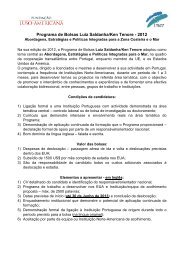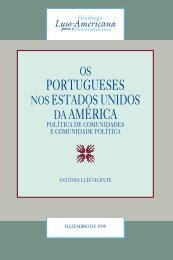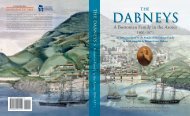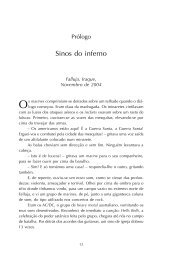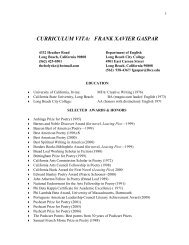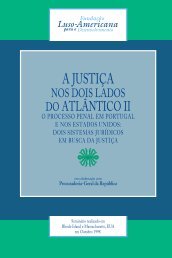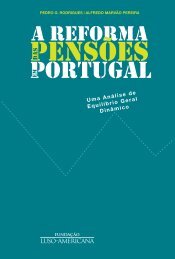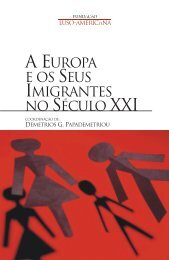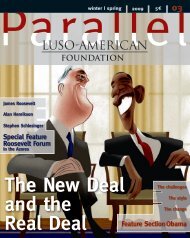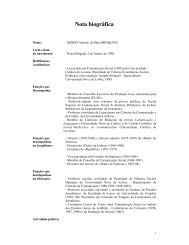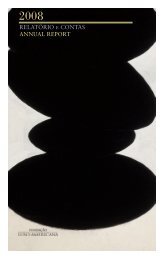A decade later - Fundação Luso-Americana
A decade later - Fundação Luso-Americana
A decade later - Fundação Luso-Americana
You also want an ePaper? Increase the reach of your titles
YUMPU automatically turns print PDFs into web optimized ePapers that Google loves.
[TMS] As a player, Portugal was relevant.<br />
The notion that Portugal had no relevance<br />
as a player is fallacious. Once the<br />
superpowers came onto the stage, all the<br />
other actors were left very little room<br />
to maneuver, which does not necessarily<br />
mean that they had no relevance as<br />
actors. As far as Portugal is concerned,<br />
there were three or four issues involving<br />
Angola that were very important. First,<br />
according to American information<br />
we have, the lions’<br />
share of the weapons belonging<br />
to the Portuguese armed<br />
forces was left to the MPLA.<br />
Kissinger even tried to blackmail<br />
the Portuguese government<br />
– and “blackmail” was<br />
his term, not mine – saying<br />
that the Portuguese government<br />
should either guarantee<br />
that no weapons are left<br />
to the MPLA or the US would<br />
cease all the aid it was lending<br />
to airlift Portuguese<br />
colonists in Angola to<br />
Portugal. We also have to<br />
realize that Portugal was<br />
deeply divided. There were<br />
a number of policies and a<br />
number of centers of power.<br />
The second issue, which is<br />
also really important but<br />
hard to corroborate because<br />
of the lack of reliable primary<br />
sources, is the issue of<br />
the famous Battle of Luanda<br />
in July of ’75, when the FNLA tried to<br />
reenter Luanda after it had been expelled<br />
by the MPLA. According to information<br />
particularly from the American Secret<br />
Service – information denied by the<br />
Portuguese officers I spoke to – there<br />
were Portuguese troops fighting beside<br />
the MPLA to keep the FNLA out of<br />
Luanda. The third issue has to do with<br />
poLicy<br />
Portugal’s negotiating efforts at two particular<br />
points in time: during the Alvor<br />
Agreement in January, 1975 and when<br />
the MPLA and UNITA were attempting to<br />
forge an alliance against the FNLA in<br />
August of ’75. In both cases, the superpowers,<br />
particularly the superpower I<br />
deal with in my book – the United States<br />
– would try its best to destroy these<br />
diplomatic efforts – and succeed.<br />
‘ As a player, portugal was relevant.<br />
The notion that portugal had no<br />
relevance as a player is fallacious.<br />
once the superpowers came onto the<br />
stage, all the other actors were left<br />
very little room to maneuver, which<br />
does not necessarily mean that they<br />
had no relevance as actors.<br />
’<br />
[MR] Even the US considered the MPLA the<br />
only representative movement in Angola, the<br />
only one that truly represented the Angolan<br />
people.<br />
[TMS] North American operatives in<br />
Angola who understood the reality of<br />
Angola did. The ones who weren’t in<br />
Angola – like Kissinger – did not exactly<br />
share that view. They knew very little,<br />
but the ones who were there, the operatives<br />
on the ground, believed exactly<br />
that. The FNLA was – to use their expression<br />
– a “puppet of Mobutu’s.” So the<br />
MPLA was the movement in the best<br />
position to guarantee the viability of an<br />
Angolan state after independence. It was<br />
also the one most in line with Portuguese<br />
interests. Then there were other issues.<br />
There was the group in Angola represented<br />
by Admiral Rosa Coutinho.<br />
In my opinion, there were other<br />
motives – even ideological and<br />
geopolitical ones – but even so,<br />
he always favored the Soviet<br />
Union. In my book I reveal – I<br />
think for the first time – that at<br />
one point, Melo Antunes began to<br />
support Jonas Savimbi and UNITA,<br />
though in the context of a project<br />
to forge an alliance between the<br />
MPLA and UNITA. The idea was to<br />
achieve an independent Angola<br />
governed by an MPLA/UNITA alliance,<br />
in which the MPLA predominated,<br />
since it was by far the<br />
strongest movement, but offsetting<br />
the MPLA and Agostinho<br />
Neto’s power with UNITA and<br />
Jonas Savimbi. On the other hand,<br />
the idea was to lessen the MPLA’s<br />
dependence – or what was construed<br />
to be its dependence – on<br />
the USSR, by helping it to establish<br />
other diplomatic channels with,<br />
for example, Algeria and Yugoslavia.<br />
Melo Antunes tried to convince<br />
the Americans to maintain at least a<br />
threshold of good relations with the<br />
MPLA, or even support the MPLA, to<br />
reduce its dependence on Moscow. In<br />
the book I also reveal, for the first time,<br />
that Agostinho Neto “did not close the<br />
door” on good relations with the United<br />
States; actually, his stance was quite the<br />
opposite.<br />
Parallel no. 6 | FALL | WINTER 2011 43



